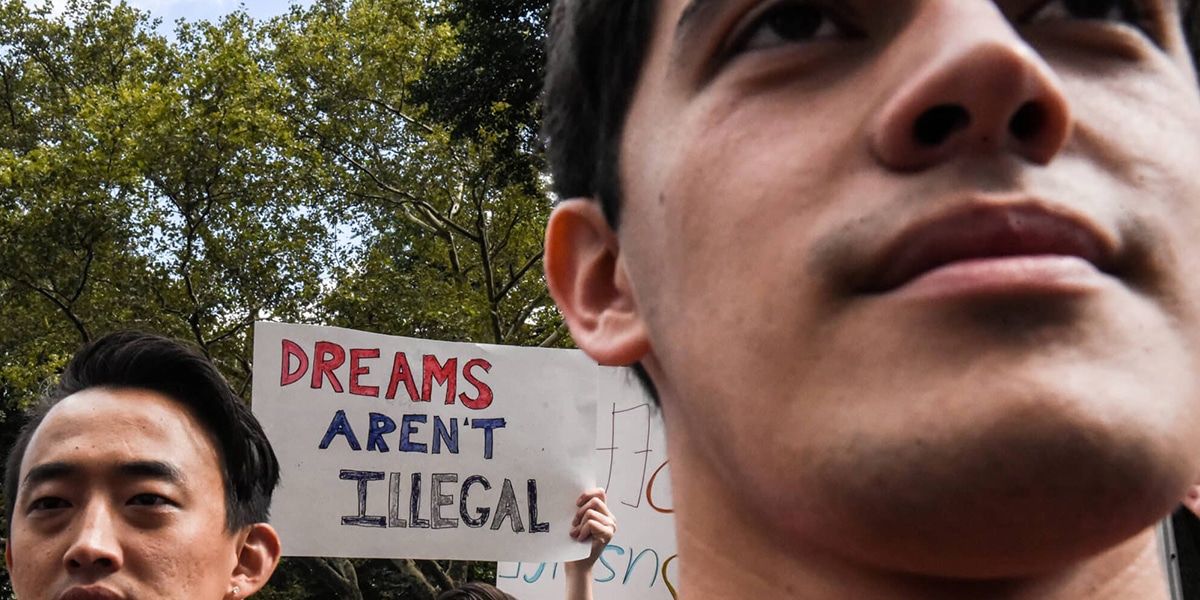“It is both our moral duty and in our nation’s best interest to protect them and allow them to reach their full God-given potential.” —Bishop Joe Vásquez
The word dream is closely connected to our cultural identity as Americans. From the idea of the American Dream to Martin Luther King Jr.‘s “I Have a Dream” speech, there’s something about that word that seems to resonate in our society. The Founding Fathers’ vision for the United States as a place where people can enjoy what the Declaration of Independence calls “life, liberty, and the pursuit of happiness” was a sort of collective dream of a bright future.
However, for the estimated 800,000 recipients of the Deferred Action for Childhood Arrivals (DACA), or “Dreamers,” their future in the United States is on shaky ground. Dreamers might be our friends, relatives, neighbors, coworkers, or complete strangers to us. But they’re all human beings with inherent dignity, a strong work ethic, and love for our country (witness the 900 Dreamers who are also military veterans). With a better understanding of who they are and how they contribute to our society—and guided by the moral compass of Catholic social teaching—we can come to the realization that their dream for a better life is interwoven with our own.
Safe—For Now
Over the past few years, there have been multiple hints, statements, and near-guarantees about rescinding DACA. In many of his campaign speeches for the 2016 election, then-candidate Donald Trump said that he would end the program on “day one” of his presidency. Following former Attorney General Jeff Sessions’ September 2017 announcement that DACA would be repealed imminently, the White House released a memo that urged Dreamers to “use the time remaining on their work authorizations to prepare for and arrange their departure from the United States.” In August 2018, Federal District Court Judge Andrew Hanen ruled that DACA is “likely unconstitutional,” but stopped short of putting an end to the program. In his decision, Judge Hanen wrote, “If the nation truly wants a DACA program, it is up to Congress to say so.”
Seemingly taking their cue from Judge Hanen’s words, on June 4, the House passed the Dream and Promise Act of 2019. This piece of legislation combines protection for both Dreamers and the estimated 320,000 people with Temporary Protected Status (TPS) who have sought refuge here from either armed conflict or natural disasters in their homelands. At the time of this writing, it remains to be seen what will happen to the act once it reaches the Senate. Even if the Senate, in a rare show of bipartisanship, passes the act, the president could exercise his veto power. The Supreme Court also denied a request from the Trump administration to fast-track a decision on DACA before its summer recess, but will likely revisit the issue when the justices reconvene in October. It seems that Dreamers are, at best, in limbo no matter how the government decides to handle DACA.
Dollars and Sense
If 800,000 Dreamers end up being deported to their countries of origin, some estimates put the financial loss the US economy will incur over the next decade at half a trillion dollars. Moreover, according to the results of a nationwide survey of Dreamers spearheaded by Professor Tom K. Wong of UC San Diego, DACA recipients have a positive impact on the local, state, and national economy. For example, 62 percent reported purchasing their first car after receiving DACA status. Nearly 75 percent are pursuing bachelor’s degrees in fields such as mechanical engineering, neuroscience, accounting, and law. Of those currently employed, 72 percent work for Fortune 500 companies, which collectively account for $2.8 trillion in revenue annually. So, even for those who maintain a position of “America first,” it’s actually better for our nation as a whole to keep Dreamers here.
Our faith leaders have weighed in on the issue, helping us to view it through a moral lens. Following the 2017 announcement that DACA would be repealed, the US Conference of Catholic Bishops (USCCB) issued a statement, saying: “The cancellation of the DACA program is reprehensible. . . . DACA youth are woven into the fabric of our country and of our Church, and are, by every social and human measure, American youth.”
Three months prior to the House’s passage of the Dream and Promise Act, Bishop Joe Vásquez of Austin, chairman of the USCCB Committee on Migration, penned a letter of support for the act. The bishop wrote: “My brother bishops and I believe in protecting the dignity of every human being, particularly that of our children and families. The Catholic bishops have long supported Dreamers and TPS holders, as well as their families. We recognize and admire these individuals as contributors to our economy, academic standouts in our universities, and leaders in our parishes. It is both our moral duty and in our nation’s best interest to protect them and allow them to reach their full God-given potential.”
What will become of the Dreamers and others in precarious immigration situations largely depends on what our political leaders decide in the coming months. But in the long run, their dreams—so closely linked with the overarching American Dream—rely on the good sense of US citizens and the solid moral ground upon which we stand. Do we have the courage to stand with them and keep their dreams alive?








